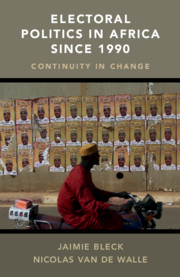Electoral Politics in Africa since 1990
Jaimie Bleck, Nicolas van de Walle (2018)
Published by Cambridge University Press, the book focuses on arguably the main institutional legacy of the widespread political transitions in African in the 1990s: the re-establishment of multiparty and multicandidate legislative and executive elections to most countries on the continent. Through a comprehensive comparative analysis of these elections, the book shows the different views and roles of voters and candidates in these elections, and analyses how elections have affected wider developments in terms of democracy and the welfare of ordinary citizens. It shows that elections have had a significant impact on the continent despite the fact that the elections themselves can only rarely be seen as democratic.
Book Description
Democratic transitions in the early 1990s introduced a sea change in Sub-Saharan African politics. Between 1990 and 2015, several hundred competitive legislative and presidential elections were held in all but a handful of the region’s countries. This book is the first comprehensive comparative analysis of the key issues, actors, and trends in these elections over the last quarter century.
The book asks: what motivates African citizens to vote? What issues do candidates campaign on? How has the turn to regular elections promoted greater democracy? Has regular electoral competition made a difference for the welfare of citizens? The authors argue that regular elections have both caused significant changes in African politics and been influenced in turn by a rapidly changing continent – even if few of the political systems that now convene elections can be considered democratic, and even if many old features of African politics persist.
Nic van de Walle
Maxwell M. Upson Professor of Government, Cornell University


